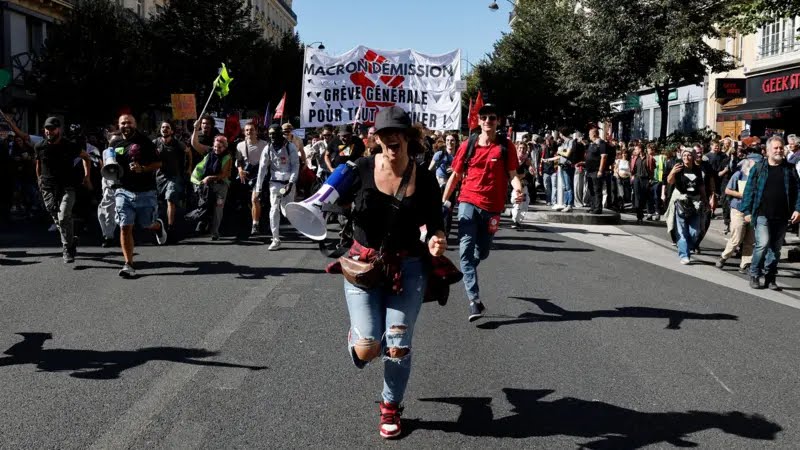Hundreds of thousands of workers took to the streets across France on Thursday in nationwide strikes against proposed budget cuts, marking one of the largest demonstrations in recent years.
Trade unions estimated turnout at around one million, while the interior ministry put the figure closer to 500,000.
Authorities deployed 80,000 police officers nationwide to maintain order.
Scuffles broke out in Lyon, Nantes and Paris, where riot police used tear gas and shields after protesters damaged shops and buildings.
More than 300 people were detained, according to officials.
The unrest comes a week after President Emmanuel Macron’s ally, Sébastien Lecornu, was appointed prime minister following the collapse of François Bayrou’s short-lived government.
Lecornu, who has yet to form a cabinet, faces a divided parliament and mounting public anger over austerity measures.
Public transport was severely disrupted, with many metro lines in Paris shut down. Protesters also blocked major roads, while students gathered at schools and universities to prevent access. Around a third of teachers joined the walkout, and pharmacists staged a near-total strike, with 98% of pharmacies closed.
Union leaders demanded increased funding for public services and higher taxes on the wealthy, rejecting Bayrou’s earlier proposal of €44 billion in cuts to reduce France’s debt.
“We need to be out in force, that’s how we gather strength,” said Sophie Binet, head of the CGT union. “We must end policies that only serve the richest.”
Many demonstrators echoed this sentiment. Cyrielle, a 36-year-old IT worker protesting in Paris, told the BBC: “Macron’s economic and social policies don’t suit me. I want more resources for public services and culture.”
Interior Minister Bruno Retailleau vowed to act firmly against unrest, warning police would intervene “at the slightest slip-up.” Opposition leader Jean-Luc Mélenchon urged demonstrators to remain disciplined, cautioning that violence would only serve the government.
France’s public debt remains a pressing challenge, equivalent to nearly €50,000 per citizen. Successive governments, including those of Bayrou and Michel Barnier, have collapsed over budget disputes, leaving Lecornu in a precarious position as he attempts to negotiate a compromise.
Despite political instability, protesters insist their message is clear. “Whether it’s Lecornu or someone else, we want workers to be truly taken into account,” said unionist Alexandre Dubois.
BBC







